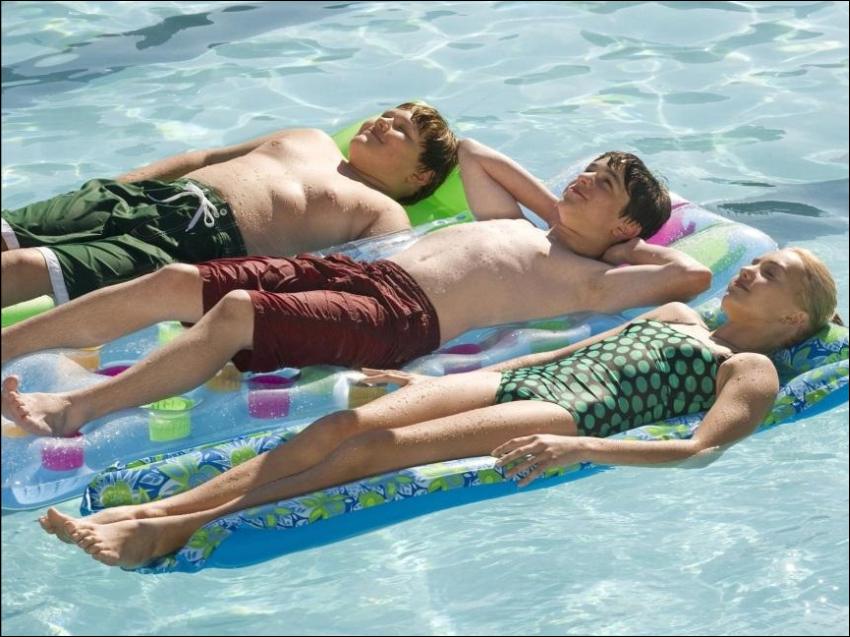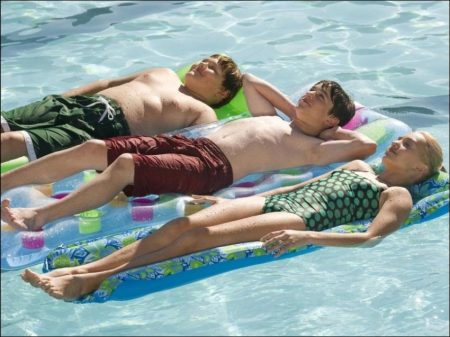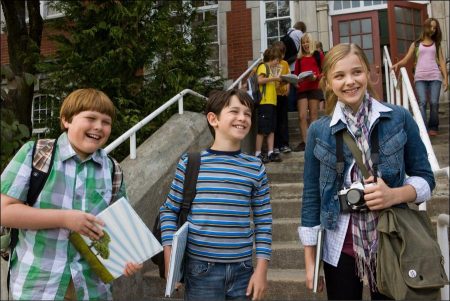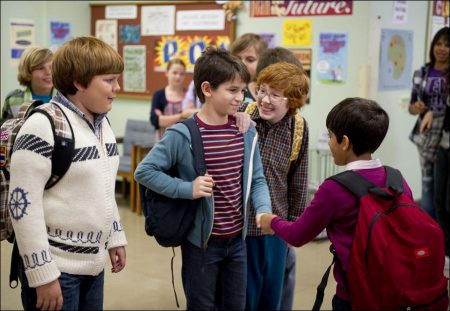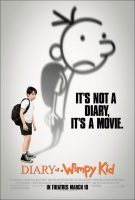Taglines: It’s Not A Diary. It’s A Movie.
The film is based on the best-selling illustrated novel “Diary of a Wimpy Kid” by Jeff Kinney, the film chronicles the adventures of wisecracking middle school student Greg Heffley over the course of an academic year, as told through the young man’s diary and hand-drawn cartoons.
To Greg Heffley, middle school is the dumbest idea ever invented. It’s a place rigged with hundreds of social landmines, not the least of which are morons, wedgies, swirlies, bullies, lunchtime banishment to the cafeteria floor – and a festering piece of cheese with nuclear cooties. To survive the never-ending ordeal and attain the recognition and status he feels he so richly deserves, Greg devises an endless series of can’t-miss schemes, all of which, of course, go awry. And he’s getting it all down on paper, via a diary – “it’s NOT a diary, it’s a journal!” Greg insists, preferring the less-sissyfied designation – filled with his opinions, thoughts, tales of family trials and tribulations, and (would-be) schoolyard triumphs. “One day when I’m famous,” writes Greg, “I’ll have better things to do than answer peoples’ stupid questions all day.” So was born the Wimpy Kid’s diary.
From its origins as a series of online cartoons, Diary of a Wimpy Kid exploded onto the pop culture scene when Jeff Kinney’s first “novel in cartoons” was published in 2007. Diary of a Wimpy Kid spent almost three years on The New York Times’ children’s best-seller list, and was translated into 33 languages. The book captured the imaginations of an army of formerly “reluctant readers,” and launched countless video reviews, social networking fan groups, and parties celebrating the release of each new Wimpy Kid book.
Diary of a Wimpy Kid is an American comedy film directed by Thor Freudenthal and based on Jeff Kinney’s book of the same name. The film stars Zachary Gordon and Devon Bostick. Robert Capron, Rachael Harris, Steve Zahn, and Chloë Grace Moretz also have prominent roles. It is the first film in the Diary of a Wimpy Kid film series followed by 2011’s Diary of a Wimpy Kid: Rodrick Rules and 2012’s Diary of a Wimpy Kid: Dog Days. It is the only film in the series to be directed by Thor Freudenthal, who was replaced by David Bowers for the next two installments.
While Kinney had originally targeted adults through the book’s nostalgic look at middle school life as told through a narrator with Walter Mitty-esque fantasies of greatness, kids immediately connected to his blending of the subversive and edgy, with fun and wholesomeness. Most of all, they responded to the titular hero’s unique voice, summed up by his signature line, “I’m stuck in middle school with a bunch of morons,” accompanied by Kinney’s drawing of Greg sitting between two classmates.
Given such pronouncements, it’s no surprise that Greg Heffley is far from a traditional role model. He’s judgmental, selfish and lazy, but nevertheless always likable. “I wanted to create a character that was realistic,” Kinney explains. “Many times in children’s literature, the protagonist is really just a miniature adult. I wanted to come up with a kid who was relatable and far from perfect. I worked hard to avoid dumbing down the books, talking down to kids, and wanted to make sure the stories avoided lots of lessons learned.”
Kinney’s many representations of the absurdity of middle school life delighted readers. A particular favorite was the “cheese touch,” which has become the stuff of middle school legend, myth, horror, disgust and gossip. At Greg’s school, a moldy piece of cheese has mysteriously appeared on the blacktop, growing more foul and powerful by the day.
If there’s a single thing these middle schoolers dread, it’s accidentally brushing against the decrepit slice and thus being branded with the cheese touch’s nuclear cooties. The only way to get rid of the cheese touch is by touching some other unfortunate classmate; it’s like a game of tag, only grosser. “No one looks back at their middle school years wishing to relive them,” says Kinney, who is an executive producer on the film. “You see a lot of movies about elementary school kids, high school students and college students, but very few set in middle school because those years are universally kind of ugly.”
It’s a world where social stratification rules the day. “In middle school, everyone is getting divided – kids are becoming either athletes or preppies or cool kids or nerds” — says producer Brad Simpson. “It’s a kid’s first real taste of adulthood.” (The school’s hierarchal landmines are in full force in the cafeteria, a hotbed of cliques where the prize is, literally, a seat at the table…or any table.)
Adds producer Nina Jacobson, a former executive at The Walt Disney Motion Picture Group: “[In middle school], you are beyond the cuteness and carefree quality of childhood, but years away from being able to drive. You’re neither cute nor cool; you’re just stuck in the middle.”
As young readers made the books a phenomenon, Hollywood came calling, eager to turn Greg Heffley’s world, friends and family into a major motion picture. Kinney’s work generated a true fervor and excitement among the team of filmmakers that came together to bring his vision to the screen. Says Nina Jacobson: “Jeff created something genuinely original that didn’t feel like anything I’d seen before and didn’t look or feel like any book I’d read before. It wasn’t the kind of book that my kids found hysterical, but I could barely tolerate. We all laughed.
“It’s written in a smart, sophisticated way that made me think of it as a kind of `Larry David in high school,” Jacobson continues, referring to the beleaguered anti-hero of the series “Curb Your Enthusiasm.” “Greg is blissfully unaware of what a jerk he can be, and kids find that refreshing and entertaining.”
“Reading the book was like looking at a scrapbook of your own adolescent bravado and stupidity,” adds co-screenwriter Jeff Judah whose writing partner Gabe Sachs echoes: “I think that writing for the screen version of Greg Heffley felt very natural because in middle school I would often do what I thought was cool, only to quickly discover that it was anything but cool.” And director Thor Freudenthal says, “There’s a blatant honesty and humor to the way Jeff Kinney describes how kids feel and act. Greg is a combination of every youngster’s worst instincts and decisions.”
While the word “wimpy” appears in the books’ and film’s titles, one could assert that “middle” is equally important to Greg Heffley. He’s stuck in every kid’s nightmare – middle school – and is the middle child caught between insolent older brother Rodrick and three-year-old, potty-training-challenged sibling Manny. But this first tale of Wimpy-ness is centered around Greg’s attempts to rise above the endless humiliations of grades 6-8: middle school.
In adapting Kinney’s book for the screen, the filmmakers were intent on being true to his characters and particularly to Greg’s flawed nature. Throughout the process, Kinney provided essential insights. “Jeff was an invaluable asset in the writing of this film,” says co-screenwriter Jeff Filgo. “He was always available for the inevitable question, like `Would Greg do this?’ `Would Rowley [Greg’s best friend] do that?’ But he also read every outline and draft, and gave priceless feedback.” Adds Jeff’s writing partner and wife, Jackie Filgo: “Greg is by turns insecure, aggressive, shy, funny, cruel, and kind; anyone who is around kids knows that they can be all of those things at different times, and every now and then all of them at once. It was our challenge to make sure Greg and his friends made the transition from book to screen with all their features and flaws intact.”
Kinney’s book provided all the essential ingredients for the film, but its episodic nature – it’s a diary (journal!), after all – necessitated that the filmmakers come up with a stronger narrative drive. So they focused on the friendship between Greg and Rowley Jefferson. Having known each other since elementary school (all those years ago!), Greg and Rowley are connected by their shared experiences. On the other hand, they’re polar opposites: Greg is battle-weary and hyper-ambitious. He has a harsh view of the world, yet is optimistic about his ability to work the system to his advantage. Rowley is the omega to Greg’s alpha – and happily so, at least to a point. He’s an innocent kid without an agenda, whereas Greg is all agenda.
The character of Rowley is one of the most popular among the book’s fans, including the filmmakers. “He’s certainly one of my favorites,” admits Jeff Kinney. “Rowley just wants to enjoy the world and his school experience.” Adds Nina Jacobson: “We all love Rowley’s humor and innocence and freshness. One of my favorite Greg-Rowley exchanges is when Rowley tells his friend that `My mom told me that people will like me if I am just myself.’ To which Greg responds, `Well, that would be good advice, if you were someone else.’ That pretty much sums up their dynamic. Greg feels that Rowley has to be molded, improved, shaped and finessed, but Rowley’s pretty comfortable in his own skin – and that ends up translating into something that looks a lot like confidence. And confidence is the key to surviving middle school.”
Diary of a Wimpy Kid (2010)
Directed by: Thor Freudenthal
Starring: Chloë Grace Moretz, Steve Zahn, Rachael Harris, Devon Bostick, Zachary Gordon, Cindy Busby, Alex Ferris, Laine MacNeil, Andrew McNee, Belita Moreno, Rob LaBelle, Karan Brar
Screenplay by: Jackie Filgo
Production Design by: Brent Thomas
Cinematography by: Jack N. Green
Film Editing by: Wendy Greene Bricmont
Costume Design by: Monique Prudhomme
Set Decoration by: Mary-Lou Storey
Art Direction by: Shannon Grover
Music by: Theodore Shapiro
MPAA Rating: PG for ome rude humor and language.
Studio: 20th Century Fox
Release Date: March 19, 2010
